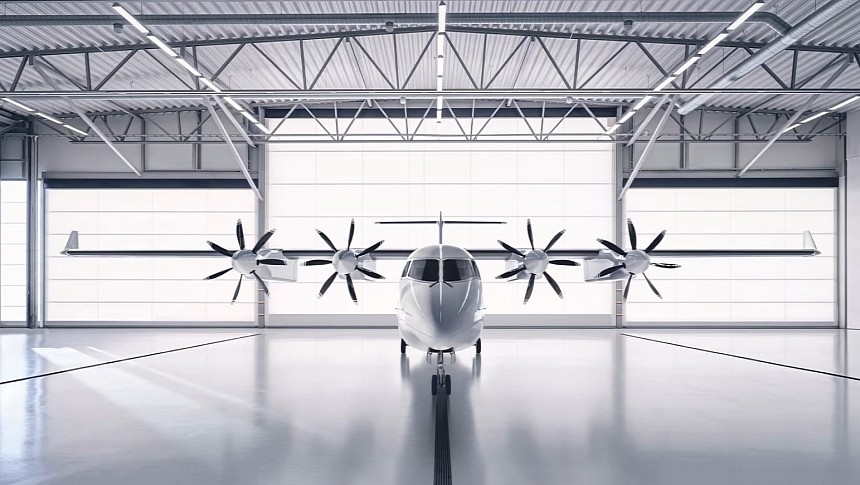While most prominent players in commercial aviation are focusing on SAF (Sustainable Aviation Fuel) as the most practical solution available right now for lowering emission levels, some bold operators are taking a step further toward battery-electric alternatives. In the case of Heart Aerospace, the new type of aircraft is getting considerable support from officials and essential industry partners.
Malmo Airport is gearing up for an exciting endeavor that will most likely write history. The ES-30, an all-electric aircraft designed for 30 passengers, will be at the center of groundbreaking tests and demonstrations at this location. It may sound simple, but it's only the tip of the iceberg, meaning there's a complex project behind this, with numerous players involved.
It all started five years ago when Sweden launched a trailblazing project that was specifically dedicated to electric aviation. During the project's second phase, known as ELISE 2, the Heart Aerospace startup designed and developed a Swedish-made electric aircraft with 19 seats (the equivalent of a regional airliner), the ES-19.
It's now time for ELISE 3 to roll out. This complex phase includes the development and testing of a full-scale model of the ES-30, which is the 30-seat version of the original electric airliner.
Tests are set to start this summer at Malmo Airport, with two main focuses: electric charging using the airport infrastructure and taxiing operations. The aviation startup is joined by Northvolt (the battery provided for the ES-30), BRA and SAS (two airlines), and Swedavia (the company that owns and operates the national network of airports).
Swedavia is one of the global leaders when it comes to promoting electric aviation. It participated in several projects for emission-free aviation, and it's linked to the addition of electric charging stations in multiple airports. These include Malmo, Visby, and Are Ostersund Airport.
ELISE 3 is a long-term project scheduled to be completed in 2025, and it's getting SEK 20 million ($1.8 million) from Vinnova (Sweden's innovation authority).
The 30-seat ES-30 promises a range of 200 km (124 miles) in full-electric mode. If the passenger number is reduced, or if it switches to hybrid-electric propulsion, the range can be increased dramatically to 800 km (497 miles).
The ES-19 featured a 400 kW electric motor and a lithium-ion battery pack. In addition to the primary goal of cutting emission levels, the Heart Aerospace aircraft also promised to offer huge advantages in terms of costs. The startup claimed that its motor is 20 times less expensive than conventional turboprops of the same size and that maintenance costs can be 100 times lower.
The Swedish electric concept was convincing enough to draw worldwide attention. In 2022, United Airlines committed to buying 200 ES-19 aircraft from Heart Aerospace. Earlier this year, Air New Zealand added Heart to its selection of manufacturers for a future green fleet known as Mission Next Gen Aircraft.
It all started five years ago when Sweden launched a trailblazing project that was specifically dedicated to electric aviation. During the project's second phase, known as ELISE 2, the Heart Aerospace startup designed and developed a Swedish-made electric aircraft with 19 seats (the equivalent of a regional airliner), the ES-19.
It's now time for ELISE 3 to roll out. This complex phase includes the development and testing of a full-scale model of the ES-30, which is the 30-seat version of the original electric airliner.
Tests are set to start this summer at Malmo Airport, with two main focuses: electric charging using the airport infrastructure and taxiing operations. The aviation startup is joined by Northvolt (the battery provided for the ES-30), BRA and SAS (two airlines), and Swedavia (the company that owns and operates the national network of airports).
Swedavia is one of the global leaders when it comes to promoting electric aviation. It participated in several projects for emission-free aviation, and it's linked to the addition of electric charging stations in multiple airports. These include Malmo, Visby, and Are Ostersund Airport.
ELISE 3 is a long-term project scheduled to be completed in 2025, and it's getting SEK 20 million ($1.8 million) from Vinnova (Sweden's innovation authority).
The 30-seat ES-30 promises a range of 200 km (124 miles) in full-electric mode. If the passenger number is reduced, or if it switches to hybrid-electric propulsion, the range can be increased dramatically to 800 km (497 miles).
The ES-19 featured a 400 kW electric motor and a lithium-ion battery pack. In addition to the primary goal of cutting emission levels, the Heart Aerospace aircraft also promised to offer huge advantages in terms of costs. The startup claimed that its motor is 20 times less expensive than conventional turboprops of the same size and that maintenance costs can be 100 times lower.
The Swedish electric concept was convincing enough to draw worldwide attention. In 2022, United Airlines committed to buying 200 ES-19 aircraft from Heart Aerospace. Earlier this year, Air New Zealand added Heart to its selection of manufacturers for a future green fleet known as Mission Next Gen Aircraft.








